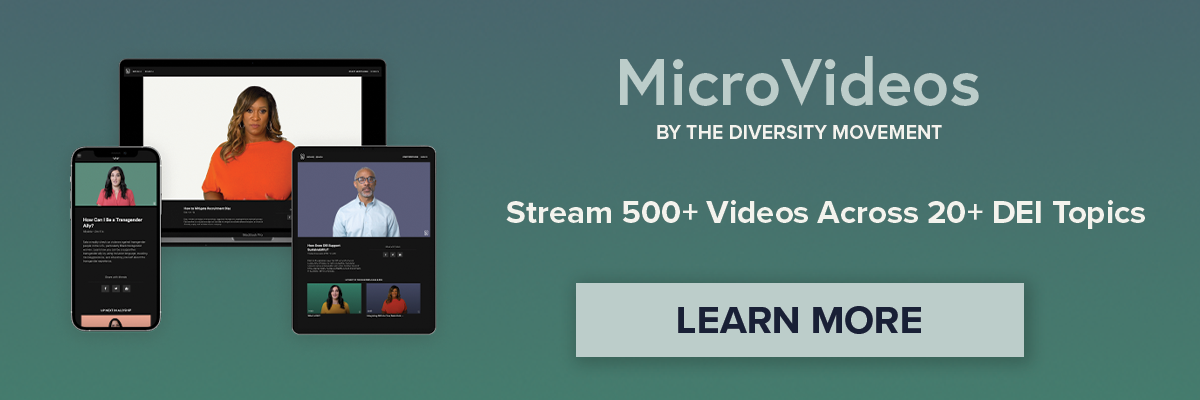Frontline employees are the face of your organization and represent your corporate values when interacting with customers, clients, and consumers. Traditionally, diversity, equity, and inclusion (DEI) education and training has been focused on inclusion efforts within an organization. However, investing in DEI education pathways for your frontline employees also ensures that your organization’s values are expressed outwardly to the people you serve.
As you consider your current and potential markets, you are likely to find that your frontline employees engage with people from all different backgrounds — all genders, ethnicities, races, socioeconomic origins, religions, nationalities, and more. The United States’ population is diversifying even faster than scientists predicted, and in fact, just last year, the Brookings Institute reported that “nearly 4 of 10 Americans identify with a race or ethnic group other than White.”
How do you make sure that your customer-facing employees are trained to act inclusively toward all of your organization’s critical stakeholders, including your customers, clients, and consumers? Integrate brief, to-the-point learning into the flow of work.
Why train your frontline teams on DEI topics
Hidden bias can have a huge impact on the clients and customers your organization is hoping to serve — especially in industries like healthcare and technology. As an example, Business Insider recently reported on racial disparities in medical treatment and how system-based bias can negatively impact healthcare outcomes for people of color. Their key takeaway? “Just as all physicians must achieve sufficient knowledge of the structure and function of the body, all must also be trained in social topics that cause barriers to health equity, including the role they may inadvertently play in perpetuating those barriers.”
In a similar study, Harvard Business Review reported that frontline employees replying to customer email inquiries were “less responsive to nonwhite customers and objectively less helpful and friendly.” Across industries, research proves that customer-facing employees are under-trained in DEI best practices.
Common topics in inclusion training include: cultural awareness, inclusive language, microaggressions, anti-harassment, stereotyping, and unconscious bias. Training your employees to better work beside and communicate with people of different backgrounds is essential not only between coworkers but also when interacting with customers. Every interaction or communication with a customer can be improved to be more respectful and inclusive through DEI training. By not addressing frontline workers in your DEI education strategy, your organization is at risk of losing customers because of microaggressions and other biased behavior from your customer service professionals.
How to integrate DEI learning for frontline professionals
DEI training for frontline professionals will need to be structured according to your frontline teams’ unique schedules and unique needs. In that vein, a recent study from Axonify found that frontline employees want asynchronous, flexible, digital, and repeatable training. Ideally, they want training that is embedded in the workflow — not another, additional thing to manage, but education that fits into the cracks of their already full and busy day.
As you research DEI training methods, remember that it is more efficient and impactful to offer continuous, regular micro-learning than day-long training sessions or yearly retreats. This rule applies to all employee demographics, not just frontline professionals. Consider using a mobile-first training approach that is accessible on a variety of operating systems. Including short videos and exercises will keep the employees engaged and informed. Emphasize inclusive communication and types of biases that people may encounter in customer-facing roles.
For employees on the go, repetition is key. The Forgetting Curve suggests how quickly we lose information without repetition and reinforcement. According to their research, within 1 hour people will forget 50% of the information presented. Within 24 hours, people will forget 70% of the information presented, and within 1 week people will forget 90% of the information presented.Micro-learning allows for large amounts of information to be broken down into digestible chunks, which improves understanding, retention, and engagement.
Preparing for DEI resistance or fatigue
Employees may struggle to see the immediate value of their training. As such, it’s important that you prepare ahead of time for some level of resistance, ambivalence, and/or DEI fatigue. To counteract those natural reactions, make learning easy, fun, and relevant.
Leverage gamification to acknowledge employees who complete, commit to, or continue their personal development and DEI education. Encouraging friendly competition helps support continuous growth. Visually-stimulating learning methods — like interactive quizzes, games, and collaborative challenges — can help employees retain more information and feel incentivized to continue participating long after the exciting and novel first phase. One great resource for gamified learning is The Diversity Movement’s TDM Connect: a mobile app that reinforces DEI learning through team challenges and personal experiences designed to enhance empathy, compassion, and create more inclusive workplace cultures.
Through it all, make sure company leaders extend communications and updates on DEI policy and progress to include frontline professionals. Frontline employees who are trained to be inclusive will allow customers to feel welcome and accepted as their full, authentic selves. The collection of positive experiences will drive more loyalty to your brand and improve your reputation among your community. And, perhaps most importantly, when we practice acting inclusively toward customers and clients, we also learn to act inclusively toward fellow employees as well. In the continued practice of DEI learning, frontline professionals hold great power to not only impact your brand perception but also positively reshape your internal workplace culture.







